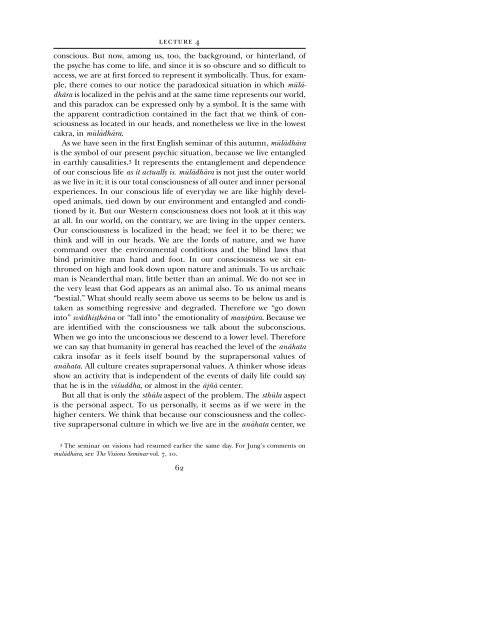CG JUNG - Countryside Anarchist
CG JUNG - Countryside Anarchist
CG JUNG - Countryside Anarchist
You also want an ePaper? Increase the reach of your titles
YUMPU automatically turns print PDFs into web optimized ePapers that Google loves.
LECTURE 4<br />
conscious. But now, among us, too, the background, or hinterland, of<br />
the psyche has come to life, and since it is so obscure and so difficult to<br />
access, we are at first forced to represent it symbolically. Thus, for example,<br />
there comes to our notice the paradoxical situation in which mÖlvdhvra<br />
is localized in the pelvis and at the same time represents our world,<br />
and this paradox can be expressed only by a symbol. It is the same with<br />
the apparent contradiction contained in the fact that we think of consciousness<br />
as located in our heads, and nonetheless we live in the lowest<br />
cakra, in mÖlvdhvra.<br />
As we have seen in the first English seminar of this autumn, mÖlvdhvra<br />
is the symbol of our present psychic situation, because we live entangled<br />
in earthly causalities. 3 It represents the entanglement and dependence<br />
of our conscious life as it actually is. mÖlvdhvra is not just the outer world<br />
as we live in it; it is our total consciousness of all outer and inner personal<br />
experiences. In our conscious life of everyday we are like highly developed<br />
animals, tied down by our environment and entangled and conditioned<br />
by it. But our Western consciousness does not look at it this way<br />
at all. In our world, on the contrary, we are living in the upper centers.<br />
Our consciousness is localized in the head; we feel it to be there; we<br />
think and will in our heads. We are the lords of nature, and we have<br />
command over the environmental conditions and the blind laws that<br />
bind primitive man hand and foot. In our consciousness we sit enthroned<br />
on high and look down upon nature and animals. To us archaic<br />
man is Neanderthal man, little better than an animal. We do not see in<br />
the very least that God appears as an animal also. To us animal means<br />
“bestial.” What should really seem above us seems to be below us and is<br />
taken as something regressive and degraded. Therefore we “go down<br />
into” svvdhiü°hvna or “fall into” the emotionality of maõipÖra. Because we<br />
are identified with the consciousness we talk about the subconscious.<br />
When we go into the unconscious we descend to a lower level. Therefore<br />
we can say that humanity in general has reached the level of the anvhata<br />
cakra insofar as it feels itself bound by the suprapersonal values of<br />
anvhata. All culture creates suprapersonal values. A thinker whose ideas<br />
show an activity that is independent of the events of daily life could say<br />
that he is in the viçuddha, or almost in the vjñv center.<br />
But all that is only the sthÖla aspect of the problem. The sthÖla aspect<br />
is the personal aspect. To us personally, it seems as if we were in the<br />
higher centers. We think that because our consciousness and the collective<br />
suprapersonal culture in which we live are in the anvhata center, we<br />
3 The seminar on visions had resumed earlier the same day. For Jung’s comments on<br />
mulvdhvra, see The Visions Seminar vol. 7, 10.<br />
62


